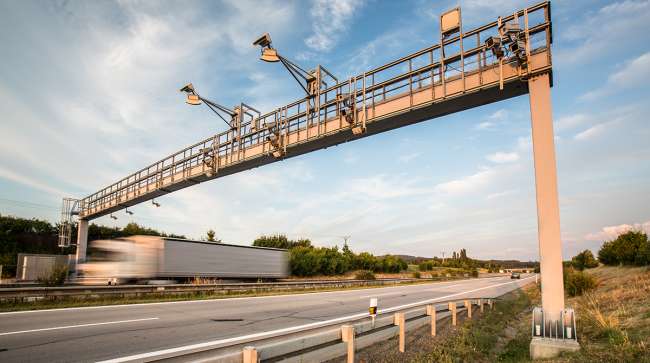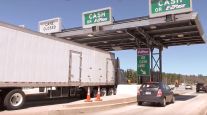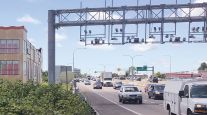Senior Reporter
States Will Lead in Infrastructure Funding Innovations, IBTTA Panelists Say

BALTIMORE — Infrastructure funding programs across several states eventually will serve as models for federal transportation agencies, experts at a conference hosted by a tolling advocacy group indicated Oct. 15.
Robert Poole, director of transportation policy at Reason Foundation, and author of the new book “Rethinking America’s Highways,” said he continues to observe states opting to test vehicle-miles-traveled pilot projects as well as expand tolling systems as funding alternatives for long-term infrastructure projects.

Oregon transportation officials, for example, continue to test a vehicle-miles-traveled fee. Like the name suggests, the program charges drivers for the miles they travel by recording their movements via a device.
“I think we should all be supportive of the four or five states that are seriously looking at toll-financed interstate reconstruction in one form or another and try to steer them in the direction of making this a real value proposition for the customers of those interstates,” Poole said at the International Bridge, Tunnel and Turnpike Association annual conference.
“You’re seeing the states with dedicated sales taxes, etc. So, I think the states are going to take the lead,” IBTTA CEO Patrick Jones said. Speaking with Transport Topics, he added, “The states are going to be the incubators and the innovators.”

Gribbin
While officials across states and municipalities determine a path forward on long-term funding for infrastructure construction and maintenance, political leaders also should clarify a unifying directive for their programs, said Joseph Kane, a senior research associate at the Brookings Institution.
“There’s a lack of, really, an economic vision across the country. It’s great that we’re kind of spending for infrastructure sake to get projects done, but I still think there’s a missing piece of the puzzle here,” Kane noted.
Tolling initiatives, such as Rhode Island’s truck-only program, could be emulated by other state officials, said D.J. Gribbin, President Donald Trump’s former infrastructure adviser. Gribbin is now a senior operating partner at Stonepeak Infrastructure Partners.
In Rhode Island, the first two truck-tolling gantries launched in June. When completed, the state transportation agency said 13 tolling areas will generate $45 million annually, some $4 million of which will be directed to operation and maintenance costs.
Trucking interests, led by American Trucking Associations, Cumberland Farms Inc., M&M Transport Services Inc. and New England Motor Freight, are pushing back in Rhode Island. They filed a lawsuit July 10 contesting the constitutionality of the state’s tolling program, arguing that it discriminates against interstate commerce.
You’re seeing the states with dedicated sales taxes, etc. So, I think the states are going to take the lead.
Patrick Jones, IBTTA CEO
“We are eager to have our day in court and to see these unconstitutional barriers to commerce taken down so Rhode Island can get serious about infrastructure funding through user fees that fairly distribute the burden among all who benefit from the state’s highways,” an ATA spokesman has said.
IBTTA continues to press federal policymakers on tolling-centric proposals. The group’s president, Tim Stewart, executive director of the Colorado-based E-470 Public Highway Authority, said he hopes attendees at the annual event take with them strategies for expanding opportunities and investments in their regions.
With funding authority for a federal highway account expiring in about two years, members of Congress are scrambling to devise a long-term plan that would be designed to meet the infrastructure needs of state and local agencies. Transportation leaders on Capitol Hill often highlight the potential benefits that could stem from adopting alternative sources of revenue meant to boost the Highway Trust Fund. The fund is backed by dwindling revenue from the 24.4-cent diesel tax and 18.4-cent gas tax.
This summer, outgoing House Transportation and Infrastructure Committee Chairman Bill Shuster (R-Pa.) unveiled an outline that called for increasing fuel taxes slightly, a proposal that his Republican colleagues did not embrace.
In February, the White House unveiled a 10-year, $1.5 trillion infrastructure proposal that called for significant reliance on public-private partnerships. That plan, which specifically called for giving states flexibility from federal tolling restrictions, was a nonstarter on Capitol Hill.



